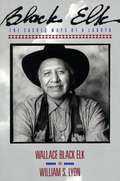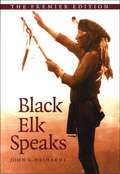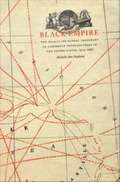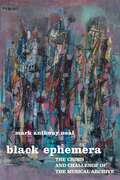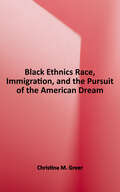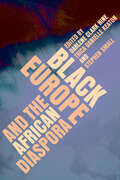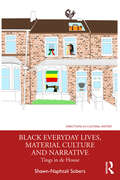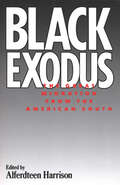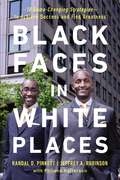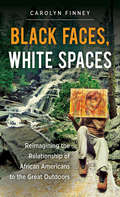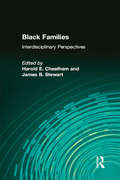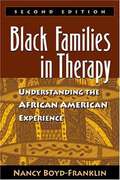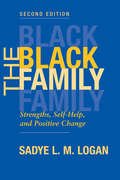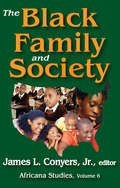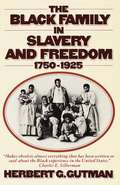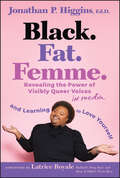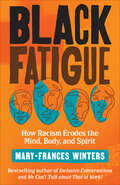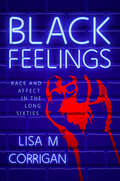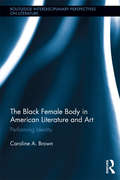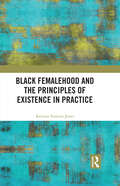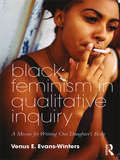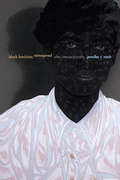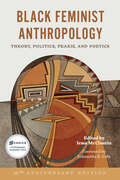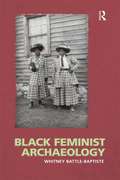- Table View
- List View
Black Elk: The Sacred Ways of a Lakota
by Wallace H. Black Elk William S. LyonBlack Elk writes about religion and mythology in the Lakota Nation and North American shamanism.
Black Elk Speaks: Being the Life Story of a Holy Man of the Oglala Sioux (Premier Edition)
by John G. NeihardtBlack Elk Speaks is widely hailed as a religious classic, one of the best spiritual books of the modern era and the bestselling book of all time by an American Indian. This inspirational and unfailingly powerful story reveals the life and visions of the Lakota healer Nicholas Black Elk (1863-1950) and the tragic history of his Sioux people during the epic closing decades of the Old West. In 1930, the aging Black Elk met a kindred spirit, the famed poet, writer, and critic John G. Neihardt (1881-1973) on the Pine Ridge Reservation in South Dakota. The Lakota elder chose Neihardt to share his visions and life with the world. Neihardt understood and today Black Elk is known to all.
Black Empire: The Masculine Global Imaginary of Caribbean Intellectuals in the United States, 1914-1962
by Michelle Ann StephensIn Black Empire, Michelle Ann Stephens examines the ideal of "transnational blackness" that emerged in the work of radical black intellectuals from the British West Indies in the early twentieth century. Focusing on the writings of Marcus Garvey, Claude McKay, and C. L. R. James, Stephens shows how these thinkers developed ideas of a worldwide racial movement and federated global black political community that transcended the boundaries of nation-states. Stephens highlights key geopolitical and historical events that gave rise to these writers' intellectual investment in new modes of black political self-determination. She describes their engagement with the fate of African Americans within the burgeoning U. S. empire, their disillusionment with the potential of post-World War I international organizations such as the League of Nations to acknowledge, let alone improve, the material conditions of people of color around the world, and the inspiration they took from the Bolshevik Revolution, which offered models of revolution and community not based on nationality. Stephens argues that the global black political consciousness she identifies was constituted by both radical and reactionary impulses. On the one hand, Garvey, McKay, and James saw freedom of movement as the basis of black transnationalism. The Caribbean archipelago--a geographic space ideally suited to the free movement of black subjects across national boundaries--became the metaphoric heart of their vision. On the other hand, these three writers were deeply influenced by the ideas of militarism, empire, and male sovereignty that shaped global political discourse in the early twentieth century. As such, their vision of transnational blackness excluded women's political subjectivities. Drawing together insights from American, African American, Caribbean, and gender studies, Black Empire is a major contribution to ongoing conversations about nation and diaspora.
Black Ephemera: The Crisis and Challenge of the Musical Archive
by Mark Anthony NealPROSE Award- Music and Performing Arts Category WinnerA framework for understanding the deep archive of Black performance in the digital eraIn an era of Big Data and algorithms, our easy access to the archive of contemporary and historical Blackness is unprecedented. That iterations of Black visual art, such as Bert Williams’s 1916 silent film short “A Natural Born Gambler” or the performances of Josephine Baker from the 1920s, are merely a quick YouTube search away has transformed how scholars teach and research Black performance.While Black Ephemera celebrates this new access, it also questions the crisis and the challenge of the Black musical archive in a moment when Black American culture has become a global export. Using music and sound as its primary texts, Black Ephemera argues that the cultural DNA of Black America has become obscured in the transformation from analog to digital. Through a cross-reading of the relationship between the digital era and culture produced in the pre-digital era, Neal argues that Black music has itself been reduced to ephemera, at best, and at worst to the background sounds of the continued exploitation and commodification of Black culture. The crisis and challenges of Black archives are not simply questions of knowledge, but of how knowledge moves and manifests itself within Blackness that is obscure, ephemeral, fugitive, precarious, fluid, and increasingly digital. Black Ephemera is a reminder that for every great leap forward there is a necessary return to the archive. Through this work, Neal offers a new framework for thinking about Black culture in the digital world.
Black Ethnics: Race, Immigration, and the Pursuit of the American Dream
by Christina M. GreerIn an age where racial and ethnic identity intersect, intertwine, and interact in increasingly complex ways, Black Ethnics: Race, Immigration, and the Pursuit of the American Dream offers a superb and rigorous analysis of black politics and coalitions in the post-Civil Rights era. Using an original survey of a New York City labor population and multiple national data sources, author Christina M. Greer explores the political significance of ethnicity for new immigrant and native-born blacks. Black Ethnics concludes that racial and ethnic identities affect the ways in which black ethnic groups conceptualize their possibilities for advancement and placement within the American polity. The ethnic and racial dual identity of blacks leads to significant distinctions in political behavior, feelings of incorporation, and policy choices in ways not previously theorized. The steady immigration of black populations from Africa and the Caribbean over the past few decades has fundamentally changed the racial, ethnic, and political landscape in the U.S. An important question for social scientists is how these "new" blacks will behave politically in the US. Should we expect new black immigrants to orient themselves to politics in the same manner as native Blacks? Will the different histories of the new immigrants and native-born blacks lead to different political orientations and behavior, and perhaps to political tensions and conflict among black ethnic groups residing in America? And to what extent will this new population fracture the black coalition inside of the Democratic party? With increases in immigration of black ethnic populations in the U.S., the political, social, and economic integration processes of black immigrants does not completely echo that of native-born American blacks. The emergent complexity of black intra-racial identity and negotiations within the American polity raise new questions about black political incorporation, assimilation, acceptance, and fulfillment of the American Dream. By comparing Afro-Caribbean and African groups to native-born blacks, this book develops a more nuanced and accurate understanding of the 'new black America' in the twenty-first century. Lastly, Black Ethnics explores how foreign-born blacks create new ways of defining and understanding black politics and coalitions in the post-Civil Rights era.
Black Europe and the African Diaspora (New Black Studies Series)
by Allison Blakely Jacqueline Nassy Brown Tina Campt Fred Constant Alessandra Di Maio Philomena Essed Terri Francis Barnor Hesse Darlene Clark Hine Dienke Hondius Eileen Julien Trica Danielle Keaton Kwame Nimako Tiffany Ruby Patterson T Denean Sharpley-Whiting Stephen Small Tyler Stovall Alexander G Weheliye Gloria Wekker Michelle M WrightThe presence of Blacks in a number of European societies has drawn increasing interest from scholars, policymakers, and the general public. This interdisciplinary and multi-disciplinary collection penetrates the multifaceted Black presence in Europe, and, in so doing, complicates the notions of race, belonging, desire, and identities assumed and presumed in revealing portraits of Black experiences in a European context. In focusing on contemporary intellectual currents and themes, the contributors theorize and re-imagine a range of historical and contemporary issues related to the broader questions of blackness, diaspora, hegemony, transnationalism, and "Black Europe" itself as lived and perceived realities. Contributors are Allison Blakely, Jacqueline Nassy Brown, Tina Campt, Fred Constant, Alessandra Di Maio, Philomena Essed, Terri Francis, Barnor Hesse, Darlene Clark Hine, Dienke Hondius, Eileen Julien, Trica Danielle Keaton, Kwame Nimako, Tiffany Ruby Patterson, T. Denean Sharpley-Whiting, Stephen Small, Tyler Stovall, Alexander G. Weheliye, Gloria Wekker, and Michelle M. Wright.
Black Europe and the African Diaspora (The New Black Studies Series)
by Stephen Small Trica Danielle Keaton Darlene Clark HineThe presence of Blacks in a number of European societies has drawn increasing interest from scholars, policymakers, and the general public. This interdisciplinary and multi-disciplinary collection penetrates the multifaceted Black presence in Europe, and, in so doing, complicates the notions of race, belonging, desire, and identities assumed and presumed in revealing portraits of Black experiences in a European context. In focusing on contemporary intellectual currents and themes, the contributors theorize and re-imagine a range of historical and contemporary issues related to the broader questions of blackness, diaspora, hegemony, transnationalism, and "Black Europe" itself as lived and perceived realities.
Black Everyday Lives, Material Culture and Narrative: Tings in de House (Directions in Cultural History)
by Shawn-Naphtali SobersThis book is a ground-breaking exploration of everyday life as experienced through the lens of Black British cultural history and creative practice, through a multiplicity of voices and writing styles.The structure of Black Everyday Lives, Material Culture and Narrative examines life through a personal study of the family home – room by room, object by object – as a portal through which to examine the intricacies and nuances of daily considerations of African heritage people living in Britain in the modern era (post-1950). Using Small Anthropology methodology, this book foregrounds the experiences of Black British lives by bringing the threads of history and culture into the relevancy of the present day and demonstrates how the personal sphere directly links to wider public and political concerns.This book will be of interest to a wide range of disciplines, including Black studies, anthropology, cultural studies, history, visual culture, photography, media communication, sociology, community development, art and design, and by any course that studies ethnographic methodologies, material culture, migration, everyday life, and British society.
Black Exodus: The Great Migration from the American South
by Alferdteen HarrisonWith essays by Blyden Jackson, Dernoral Davis, Stewart E. Tolnay and E. M. Beck, Carole Marks, James R. Grossman, and William Cohen and Neil R. McMillenWhat were the causes that motivated legions of black southerners to immigrate to the North? What was the impact upon the land they left and upon the communities they chose for their new homes? Perhaps no pattern of migration has changed America's socioeconomic structure more than this mass exodus of African Americans in the first half of the twentieth century. Because of this exodus, the South lost not only a huge percentage of its inhabitants to northern cities like Chicago, New York, Detroit, and Philadelphia but also its supply of cheap labor. Fleeing from racial injustice and poverty, southern blacks took their culture north with them and transformed northern urban centers with their churches, social institutions, and ways of life. In Black Exodus eight noted scholars consider the causes that stimulated the migration and examine the far-reaching results.
Black Faces in White Places: 10 Game-Changing Strategies to Achieve Success and Find Greatness
by Randal Pinkett Jeffrey Robinson Philana PattersonIf the name Randal Pinkett sounds familiar, it may be because Pinkett was the first African-American winner on The Apprentice. When he won, this black man also became the only contestant to be asked to share his victoryùwith a white woman. The request (and Pinkett's subsequent refusal) set off a firestorm of controversy that inevitably focused on the issue of race in the American workplace and in society. For generations, African-Americans have been told that to succeed, they need to work twice as hard as everyone else. But as millions of black Americans were reminded by Pinkett's experience, sometimes hard work is not enough. Black Faces in White Places is about ôthe gameöùthat is, the competitive world in which we all live and work. The book offers 10 revolutionary strategies for playing, mastering, and changing the game for the current generation, while undertaking a wholesale redefinition of the rules for those who will follow. It is not only about shattering the old ôglass ceiling,ö but also about examining the four dimensions of the contemporary black experience: identity, society, meritocracy, and opportunity. Ultimately, it is about changing the very concept of success itself. Based on the authors' considerable experiences in business, in the public eye, and in the minority, the book shows how African-American professionals can (and must) think and act both Entrepreneurially and ôIntrapreneurially,ö combine their collective strengths with the wisdom of others, and plant the seeds of a positive and lasting legacy.
Black Faces, White Spaces
by Carolyn FinneyWhy are African Americans so underrepresented when it comes to interest in nature, outdoor recreation, and environmentalism? In this thought-provoking study, Carolyn Finney looks beyond the discourse of the environmental justice movement to examine how the natural environment has been understood, commodified, and represented by both white and black Americans. Bridging the fields of environmental history, cultural studies, critical race studies, and geography, Finney argues that the legacies of slavery, Jim Crow, and racial violence have shaped cultural understandings of the "great outdoors" and determined who should and can have access to natural spaces. Drawing on a variety of sources from film, literature, and popular culture, and analyzing different historical moments, including the establishment of the Wilderness Act in 1964 and the aftermath of Hurricane Katrina, Finney reveals the perceived and real ways in which nature and the environment are racialized in America. Looking toward the future, she also highlights the work of African Americans who are opening doors to greater participation in environmental and conservation concerns.
Black Families: Interdisciplinary Perspectives
by Harold E. Cheatham James B. StewartThe condition and characteristics of the black family have been subjects of intense debate since at least the 1960s, when the Moynihan Report and the culture of poverty theses held sway. Since then a consistent theme has been that black families are pathological. Despite the fact that research has been inconclusive and contradictory, political debate and policy have been strongly influenced by the pathology theme. This volume presents alternative approaches toward understanding the special characteristics of black families. Extending a special issue of The Review of Black Political Economy, the book focuses on the economic circumstances and decision making of these families, employing Interdisciplinary and cross-cultural perspectives. It examines the general responses of black families to various external factors such as economic systems, and to Internal factors such as interpersonal relationships. This compendium of current thinking and research will be of interest to professionals in a number of fields, Including family studies, counseling, social work, psychology, and sociology. It will be of practical use in training programs for service delivery systems Interested In Incorporating multicultural perspectives, as well as those specifically interested in black families today.
Black Families in Therapy: Understanding the African American Experience (2nd edition)
by Nancy Boyd-FranklinBoyd-Franklin (applied and professional psychology, Rutgers U.) provides students and clinicians with an understanding of the cultural and racial context of African Americans as applied to the therapy setting. The fully revised second edition includes a new chapter on public policy issues (welfare reform, the Adoptions and Safe Families Act, kinship care, managed care, and affirmative action); a new chapter on the complexity of separation, divorce, remarriage, and step-parenting; and new material on socioeconomic and class distinctions, Caribbean and biracial children and families, racial identity development, gender roles in families, religion and spirituality, the Afrocentric movement, Rites-of-Passage programs, challenges in educational achievement, HIV/AIDS, substance abuse, violence, police brutality, and racial profiling.
The Black Family: Strengths, Self-help, And Positive Change, Second Edition
by Sadye LoganWith numerous selections designed to reinforce the goal of empowering clients to take charge of their lives, this revised and updated second edition of The Black Family serves a two-fold purpose. It extends the small but growing body of strength-oriented literature to include African-American families and it serves as a natural extension of current texts on African-American families to provide social workers and the education community with a broader framework for understanding the needs of Black families. Offering both a research orientation and a practice perspective, this book should appeal to social work educators and practitioners involved in family services, health and mental health settings, and child and public welfare.
The Black Family and Society: Africana Studies (Africana Studies)
by Jr. ConyersThis volume focuses on the black family in the United States and the social forces and issues that affect it, including education, healthcare, racism, poverty, and politics. It examines the effects of these social forces on individuals as well as families.Contributions are varied. "A Biscuit for a Letter" examines education in the antebellum South. "Black Intellectuals on Trial" and "Africans' Perspectives on Race in the US" both analyse the role of race and racism in America. "Feminization of Poverty and the Black Family" illustrates the double burden of race and gender borne by black women. "It's Gotta Be Some Drama!" analyses the televised depiction of black colleges and universities. "African-centred Research Frameworks" studies the importance of cultural awareness in academia. "Work to Be Done" recounts the activism of black women in the Democratic Party.This volume offers an interdisciplinary approach to study of the black family in the United States, taking into account the forces of the larger society that influence it. The Black Family and Society is the most recent volume in Transaction's Africana Studies series.
The Black Family in Slavery and Freedom, 1750-1925
by Herbert G. GutmanAn exhaustively researched history of black families in America from the days of slavery until just after the Civil War.
Black. Fat. Femme: Revealing the Power of Visibly Queer Voices in Media and Learning to Love Yourself
by Jonathan P. Higgins Ed.DA celebration of (and how to find your own) queer intersectional identity through the lens of media In Black. Fat. Femme: Revealing the Power of Visibly Queer Voices (in Media) and Learning to Love Yourself, educator and media critic Dr. Jonathan P. Higgins—aka Doctor Jon Paul—delivers an honest and extraordinary new take on how the author, and other Black Fat Femmes like them, have come to find and understand their identity. You'll learn about how standing at the intersection of multiple identities, communities, and causes shapes people and how they see the world. You'll also discover how public figures like Andre Leon Talley and Latrice Royale have helped people learn who they are and what is possible in life. Inside the book: An examination of the importance of real representation in the media for marginalized people Discussions of the pioneers who fought so hard to be authentically who they are, both onscreen and off Explorations of how and why Black Fat Femme people have been left out and erased from LGBTQ+ conversations Perfect for anyone with an interest in unique voices and truly singular perspectives, Black. Fat. Femme. is a one-of-a-kind book that will help you see the world with entirely new eyes.
Black Fatigue: How Racism Erodes the Mind, Body, and Spirit
by Mary-Frances WintersThe first book to define and explore the intergenerational impact of systemic racism on the health of Black people—and how to combat its pernicious effects. Black people, young and old, are fatigued, says award-winning diversity and inclusion leader Mary-Frances Winters. It is physically, mentally, and emotionally draining to continue to experience inequities and even atrocities, day after day, when justice is a God-given and legislated right. And it is exhausting to have to constantly explain this to white people, even—and especially—well-meaning white people, who fall prey to white fragility and too often are unwittingly complicit in upholding the very systems they say they want dismantled. This book, designed to illuminate the myriad dire consequences of &“living while Black,&” came at the urging of Winters&’s Black friends and colleagues. Winters describes how in every aspect of life—from economics to education, work, criminal justice, and, very importantly, health outcomes—for the most part, the trajectory for Black people is not improving. It is paradoxical that, with all the attention focused over the last fifty years on social justice and diversity and inclusion, little progress has been made in actualizing the vision of an equitable society. Black people are quite literally sick and tired of being sick and tired. &“Winters&’s work as a diversity and inclusion leader informs this exploration of the toll that systemic racism takes on Black people every single day, and the need for activism that leads to meaningful, radical change.&” —Popsugar &“Winters hopes to inspire aspiring allies with better insight into the Black experience.&” —Book Riot, &“12 Essential Books About Black History and Identity&”
Black Feelings: Race and Affect in the Long Sixties (Race, Rhetoric, and Media Series)
by Lisa M. CorriganHonorable Mention Recipient of the 2021 Marie Hochmuth Nichols Award for Outstanding Scholarship in Public Address by the National Communication AssociationIn the 1969 issue of Negro Digest, a young Black Arts Movement poet then-named Ameer (Amiri) Baraka published “We Are Our Feeling: The Black Aesthetic.” Baraka’s emphasis on the importance of feelings in Black selfhood expressed a touchstone for how the Black liberation movement grappled with emotions in response to the politics and racial violence of the era. In her latest book, award-winning author Lisa M. Corrigan suggests that Black Power provided a significant repository for negative feelings, largely Black pessimism, to resist the constant physical violence against Black activists and the psychological strain of political disappointment. Corrigan asserts the emergence of Black Power as a discourse of Black emotional invention in opposition to Kennedy-era white hope. As integration became the prevailing discourse of racial liberalism shaping midcentury discursive structures, so too, did racial feelings mold the biopolitical order of postmodern life in America. By examining the discourses produced by Martin Luther King, Malcolm X, Stokely Carmichael, Huey Newton, Eldridge Cleaver, and other Black Power icons who were marshaling Black feelings in the service of Black political action, Corrigan traces how Black liberation activists mobilized new emotional repertoires
The Black Female Body in American Literature and Art: Performing Identity (Routledge Interdisciplinary Perspectives on Literature)
by Caroline BrownThis book examines how African-American writers and visual artists interweave icon and inscription in order to re-present the black female body, traditionally rendered alien and inarticulate within Western discursive and visual systems. Brown considers how the writings of Toni Morrison, Gayl Jones, Paule Marshall, Edwidge Danticat, Jamaica Kincaid, Andrea Lee, Gloria Naylor, and Martha Southgate are bound to such contemporary, postmodern visual artists as Lorna Simpson, Carrie Mae Weems, Kara Walker, Betye Saar, and Faith Ringgold. While the artists and authors rely on radically different media—photos, collage, video, and assembled objects, as opposed to words and rhythm—both sets of intellectual activists insist on the primacy of the black aesthetic. Both assert artistic agency and cultural continuity in the face of the oppression, social transformation, and cultural multiplicity of the late twentieth and early twenty-first centuries. This book examines how African-American performative practices mediate the tension between the ostensibly de-racialized body politic and the hyper-racialized black, female body, reimagining the cultural and political ground that guides various articulations of American national belonging. Brown shows how and why black women writers and artists matter as agents of change, how and why the form and content of their works must be recognized and reconsidered in the increasingly frenzied arena of cultural production and political debate.
Black Femalehood and the Principles of Existence in Practice
by Kersuze Simeon-JonesBlack Femalehood and the Principles of Existence in Practice conceptually frames the complex trajectory of Black femalehood, including contributions and triumphs, methods of resistance, and ways of coping, as well as the impacts of external forces on their physical and psychological wellness. The book scrutinizes the work of selected female figures and their modes of resistance, including the warriors of the Haitian Revolution, diasporic African descendant combatants for human rights, and academic female writers. From battlefield combats to daily struggles for survival, it illustrates how the battles in which Black females have been compelled to engage have caused centuries of physical, emotional, and psychological distress, well into contemporary times. This volume will be of use to upper-level undergraduate students as well as graduate students studying gender studies, sociology, Black studies, and politics.
Black Feminism in Qualitative Inquiry: A Mosaic for Writing Our Daughter's Body (Futures of Data Analysis in Qualitative Research)
by Venus E. Evans-WintersRecently, Black women have taken the world stage in national politics, popular culture, professional sports, and bringing attention to racial injustice in policing and the judicial system. However, rarely are Black women acknowledged and highlighted for their efforts to understand the social problems confronting our generation and those generations that came before us. In the post-civil rights era, research faculty and theoreticians must acknowledge the marginalization of Black women scholars’ voices in contemporary qualitative scholarship and debates. Black Feminism in Qualitative Inquiry: A Mosaic for Writing our Daughter's Body engages qualitative inquiry to center the issues and concerns of Black women as researcher(s) and the researched while simultaneously questioning the ostensible innocence of qualitative inquiry, including methods of data collection, processes of data analysis, and representations of human experiences and identities. The text centers "daughtering" as the onto-epistemological tool for approaches to Black feminist and critical race data analysis in qualitative inquiry. Advanced and novice researchers interested in decolonizing methodologies and liberatory tools of analysis will find the text useful for cultural, education, political, and racial critiques that center the intersectional identities and interpretations of Black women and girls and other people of color. Daughtering as a tool of analysis in Black feminist qualitative inquiry is our own cultural and spiritual way of being, doing, and performing decolonizing work.
Black Feminism Reimagined: After Intersectionality (Next Wave: New Directions in Women's Studies)
by Jennifer C. NashIn Black Feminism Reimagined Jennifer C. Nash reframes black feminism's engagement with intersectionality, often celebrated as its primary intellectual and political contribution to feminist theory. Charting the institutional history and contemporary uses of intersectionality in the academy, Nash outlines how women's studies has both elevated intersectionality to the discipline's primary program-building initiative and cast intersectionality as a threat to feminism's coherence. As intersectionality has become a central feminist preoccupation, Nash argues that black feminism has been marked by a single affect—defensiveness—manifested by efforts to police intersectionality's usages and circulations. Nash contends that only by letting go of this deeply alluring protectionist stance, the desire to make property of knowledge, can black feminists reimagine intellectual production in ways that unleash black feminist theory's visionary world-making possibilities.
Black Feminist Anthropology, 25th Anniversary Edition: Theory, Politics, Praxis, and Poetics
by Irma McClaurinBlack Feminist Anthropology: Theory, Politics, Praxis and Poetics is a groundbreaking collection that centers the imaginative intellectual perspectives, voices, and experiences of Black American feminist anthropologists. Twenty-five years ago, as the Foreword states, this book dared to put three words together in the title—Black. Feminist. Anthropology— “that have not always kept company with each other—and in the minds of many both in and outside of the academy, they should remain separate.” Standing the test of time, it is still a bold reimagining of anthropology, and all social sciences, as inclusive and decolonized, while establishing a new Black feminist anthropology canon that decades later is too often taken for granted as normative. Black Feminist Anthropology is filled with a message of theoretical possibilities that anyone who enters its pages will find “healing,” “life-saving,” and an affirmation that Black women anthropologists have contributed much to the theory, politics, praxis and poetics of anthropology, gender and women’s studies, masculinity studies, queer studies, the social sciences generally, and any other discipline that seeks transformation from the inside out. It is both an archive and a legacy for the next generation.
Black Feminist Archaeology
by Whitney Battle-BaptisteBlack feminist thought has developed in various parts of the academy for over three decades, but has made only minor inroads into archaeological theory and practice. Whitney Battle-Baptiste outlines the basic tenets of Black feminist thought and research for archaeologists and shows how it can be used to improve contemporary historical archaeology. She demonstrates this using Andrew Jackson‘s Hermitage, the W. E. B. Du Bois Homesite in Massachusetts, and the Lucy Foster house in Andover, which represented the first archaeological excavation of an African American home. Her call for an archaeology more sensitive to questions of race and gender is an important development for the field.
